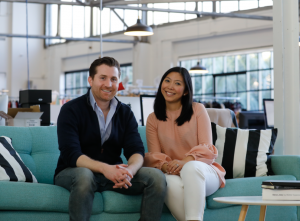Australia’s leading dress rental start-up has hit new highs this year tapping into a growing niche of customers who want to lease, and not own, high-end fashion.
Founded by a husband and wife duo in 2012, Glamcorner was the first national designer clothing rental service to pioneer a circular economy model online and is now forging new ground in the tech-fashion space.
Six years ago, Dean Jones and Audrey Khaing-Jones saw huge potential in an emerging market of on-demand, pay-per-use services like Spotify and Netflix and wanted to channel into this same model into the fashion industry to combat the growing stockpile of clothing typifying the urban woman’s wardrobe.
The couple saw a growing market of consumers willing to invest in designer clothing but who couldn’t justify the price for one-off occasions. Using their initial savings to build the business, Glamcorner capitalised on this luxury market by creating a seamless online experience enabling customers to rent luxury items at a fraction of the price.
Co-founder Dean Jones said the businesses circular economy model simply made sense given the environmental and financial implications of single-use purchases.
“My wife and I saw a few different parts of life where the sharing economy and collaborative consumption have been employed to fix problems just like this. We asked ourselves, ‘what if we could create a massive online wardrobe and allow customers to stream outfits?’ and it worked, it really struck a nerve with our core customer.”

It was this new-age consumer that values convenience over ownership that the start-up has had such huge success with.
“Our customer is a typical millennial customer, even a bit older who has a busy life and has found better ways to consume things,” Mr Jones said.
“Together they are subsidising each other’s access to designer labels.”
The couple saw potential in trailblazing the market through the circular economy model.
“We wanted to completely reinvent the traditional model and make it an online direct model where no matter where you are you can get high-end fashion the next business day and pay a fraction of the price for it.”
Six years on, the start-ups collection has sky-rocketed from 800 dresses from 60 designers in 2016 to more than 5000 dresses from more than 200 designers today and rising. The platforms boasts over 120,000 followers across their social platforms and more than 50,000 active customers on their database.
The empire now boasts more than $80 million worth of designer clothes all loaned out over the last twelve months alone and leases out an average of one dress leased out every minute this season.
The circular economy model of the business is also appealing to a growing market of environmentally conscious consumers – with the brand’s model seeing a 95 per cent reduction in the manufacturing and supply chain footprint.
The powerhouse also utilises machine learning and AI to tap into ever-evolving consumer trends. The brand uses AI tool Domo, a data analysis tool to give accurate predictions of what their customers want to wear, and was one of the first Aussie retailers to do so.
But despite the strong focus on future-tech and keeping up with emerging tech, Mr Jones says the brand is still a firm believer in traditional merchandising and curation.
“We are heavily data focused but we don’t let our prediction engines or machine learning algorithms make decisions for us they just inform our team top make a better decision.”
Now, having trailblazed an emerging market of consumers committed to conscience and convenience, the future is bright for this million-dollar start-up.
“Our mission is to completely revolutionise the way Australian women think about their wardrobe. We want to fundamentally reinvent the way you shop.”

